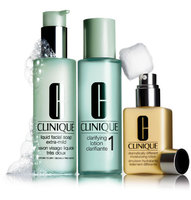Stress and your skin

With the recent National Stress Awareness Day, there’s no better time to talk about the effects that stress can have on your skin. Clinique’s Executive Director of Skin Physiology and Pharmacology, Dr Tom Mammone gets us up to speed on skin stressors.
What does stressed skin look like/what are the external signs that our skin is being damaged from stress?
Skin is a naturally renewing organ that has a very high turnover of cells. This means that new, healthy-looking cells are continually produced to keep skin looking fresh. As skin cells age, they move to the surface, lose their fats, and form a protective wall of dead flattened skin cells with the released fats holding it together. When you go through a stressful time, stress-released hormones, especially cortisol, disrupt this natural turnover-cycle of skin cells. As a result, the outermost layer of your skin does not have the solid wall of skin cells it needs to protect the new cells below. Your skin’s defensive barrier is weak and ready to let in harmful ageing elements.
Once the skin’s barrier function has been weakened, the water that skin needs to look and function best evaporates through the now porous barrier and skin cells dehydrate, going into a state of shock. As more external irritants get though the weakened barrier, skin becomes inflamed and more sensitive. Also, more harmful UV rays can penetrate the skin’s defences and damage the DNA of living cells.
Clinique recommends: Dramatically Different Moisutrizing Lotion+ which delivers a 54% improvement in skin’s barrier strength in 8 weeks.
Could you explain the way in which skin is attacked during times of stress?
Acute stress triggers reactions in your body that can both temporarily and permanently damage your skin. When you’re stressing out about something, your stress unleashes chemicals that make your skin think it’s under attack. Since there aren’t any real ‘attackers’, your skin gets confused and starts to attack itself, meaning healthy skin cells get damaged. The damage done to these cells disturbs the skin’s vital barrier function, and, as a result, skin cells and collagen supports within the skin are open to more damage. This is part of the reason periods of great stress can age people much more rapidly than normal wear and tear ages them.
Is such attack always visible or is it possible that damage can occur within the skin without any external signs (i.e. obvious sensitivity or break outs) taking place?
Over time, the damage being caused below the surface of the skin will eventually show external signs. For example, after two or three months of continuing stress, the external invaders and inflammatory reactions can permanently damage the collagen supports in your skin, eventually leading to wrinkles and faster ageing.
What can you do to help prevent stress from affecting your skin?
During periods of stress, I recommend reducing inflammatory factors such as chemical peels, dermabrasion etc. If stress triggers breakouts, avoid acne treatments or overly drying treatments. I also recommend stepping up UV protection and never underestimate the importance of a good, basic, skin care. Daily cleansing, exfoliation and moisturising with Clinique’s 3 Step can make a big difference in the way your skin looks and feels. Drinking lots of water, eating a healthy diet, getting enough sleep and exercising regularly can also help to reduce the affects of stress.
Clinique recommends: City Block Sheer SPF 25 & 3-Step Introduction Kit
The bottom line: do you truly believe inner happiness is beneficial to good/healthy skin?
Personally? Yes. The skin is the largest organ in the body and every aspect of our lifestyle can have an impact - sun exposure, diet and stress.
For more information, visit clinique.co.uk.

